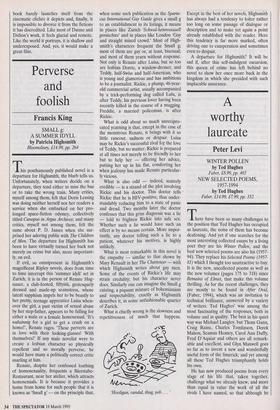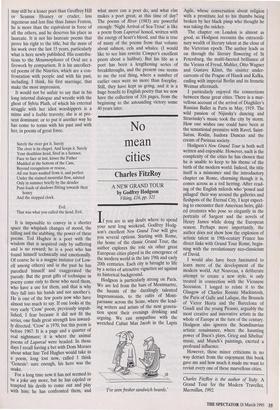A worthy laureate
Peter Levi
WINTER POLLEN by Ted Hughes Faber, £8.99, pp. 465 NEW SELECTED POEMS, 1957-1994 by Ted Hughes Faber, £14.99, £7.99, pp. 332 here have been so many challenges to the position that Ted Hughes has occupied as laureate, the noise of them has become deafening. And yet if one searches for the most interesting collected essays by a living poet they are his Winter Pollen, and the best new selected poems are also his (1957- 94). They replace his Selected Poems (1957- 81) which I thought too unattractive to buy. It is the new, uncollected poems as well as the new volumes (pages 175 to 318) since Remains of Elmet, that make this volume thrilling. As for the recent challenges, they are mostly to be found in After Ovid, (Faber, 1994), which was an invitation to technical brilliance, answered by a variety of writers. Ted Hughes' was among the most fascinating of the responses, both in volume and in quality. The best in his quiet way was Michael Langley, but Thom Gunn, Craig Raine, Charles Tomlinson, Derek Mahon, Seamus Heaney, Carol Ann Duffy, Fred D'Aquiar and others are all remark- able and excellent, and Glyn Maxwell goes so far as to invent a new and wonderfully useful form of the limerick: and yet among all these Ted Hughes triumphantly holds his own.
He has now produced poems from every stage of his life that, taken together, challenge what we already knew, and more than equal in value the work of all the rivals I have named, so that although he may still be a lesser poet than Geoffrey Hill or Seamus Heaney or cruder, less ingenious and less fine than James Fenton, he is more than the equivalent in force of all the others, and he deserves his place as laureate. It is not his laureate poems that prove his right to the title, but the mass of his work over the last 15 years, particularly what is here newly published. His contribu- tions to the Metamorphoses of Ovid are a firework by comparison. It is his uncollect- ed poems of the Nineties, which are a con- frontation with people and with his past, including, I think, his first marriage, that make the most impression.
It would not be unfair to say that in his long internal dialogue and wrestle with the ghost of Sylvia Plath, of which his external struggle with her idiot worshippers is a mime and a feeble travesty, she is at pre- sent dominant: or to put it another way he has come to terms with his past and with her, in poems of great force.
Surely the river got it. Surely The river is its chapel. And keeps it. Surely Your deathless head, fired in a furnace, Face to face at last, kisses the Father Mudded at the bottom of the Cam, Beyond recognition or rescue, All our fears washed from it, and perfect Under the stained mournful flow, saluted Only in summer briefly by the slender Punt-loads of shadows flitting towards their honey And the stopped clock. Evil.
That was what you called the head. Evil.
It is impossible to convey in a shorter space the whiplash changes of mood, the lulling and the stabbing, the power of these poems. Ted Hughes is a poet with the wisdom that is acquired only by suffering and is no reward; he is a poet who has found himself technically and emotionally. Of course he is a magpie imitator (of Low- ell among others) and in the past he has parodied himself and exaggerated the parody. But the great gifts of technique in poetry come only to those who need them, who have a use for them, and that is why they fall into his hands and not another's. He is one of the few poets now who have almost too much to say. If one looks at the very early 'Crow' poem, previously unpub- lished, I fear because it did not fit the series, one finds great strength less inward- ly directed. 'Crow' is 1970, but this poem is before 1967. It is a page and a quarter of real nightmare; it is where the animal poems of Lupercal were headed. In those days I recall having a bet with Dom Moraes about what line Ted Hughes would take in a poem, long lost now, called I think `Genesis': sure enough, his hero was the snake.
For a long time now it has not seemed to be a joke any more, but he has cajoled or tempted his devils to come out and play with him; he has confronted them, and what more can a poet do, and what else makes a poet great, at this time of day? The poems of River (1983) are powerful enough: 'Night Arrival of Sea-Trout' is like a poem from Lupercal honed, written with the energy of heart's blood, and this is true of many of the poems from that volume about salmon, eels and whales. (I would like to see him rewrite Cowper's excellent poem about a halibut). But his life as a poet has been a lengthening series of breakthroughs, and the present one seems to me the real thing, where a number of earlier ones were no more than foreplay. Still, they have kept us going, and it is a huge benefit to English poetry that we now have the collection of 316 pages, from the beginning to the astounding victory some 40 years later.



























































 Previous page
Previous page